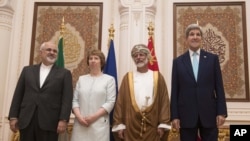Lower-level talks continue Tuesday in the Omani capital, Muscat, after Iran, the United States and its negotiating partners failed to reach a breakthrough on a comprehensive nuclear agreement. Although a self-imposed deadline of November 24 is fast approaching, both sides hint progress toward a deal remains possible.
Top diplomats from the United States, European Union and Iran ended the second of day of talks on Monday without specifying where the disagreements persist. Ahead of the talks, U.S. Secretary of State John Kerry said “real gaps” remain. Afterward, he would only say “we are working hard” toward an agreement.
Kerry left Oman for Beijing to join President Barack Obama and his National Security adviser, Susan Rice. A State Department official traveling with Kerry said a lot will be determined there in terms of next steps.
Iran hopeful about agreement
The official Iranian news agency IRNA quoted senior Iranian negotiator Abbas Araghchi as saying that while his government is not in a position to say progress has been made, he is hopeful an agreement can be reached before the deadline.
Mideast analyst Stephen Zunes of the University of San Francisco said the fact that the disagreements have not been made public is a good sign movement is possible.
"I think if there was a risk of them falling apart both sides would be leaking about the disagreements to gain one-upsmanship versus the others. But, the fact that they are keeping it quiet is indicative that they do have hopes some kind of conclusion can be reached. The bad news is that people like us on the outside don’t really know what’s going on," said Zunes.
'Pivotal states'
U.S. State Department spokeswoman Jen Psaki described the talks as being in the “pivotal stages,” and said the U.S. is focused on making progress.
"The discussions have been tough, direct and serious. And, as you know, the political directors will continue to stay in Oman for a yet-to-be-determined amount of time. They’ll be reconvening, of course, for the already-announced round of meetings that are next week in Europe," said Psaki.
Those meetings will reportedly get underway November 18 in Vienna, with the aim of an accord that would place verifiable limits on Iran’s uranium enrichment work so it cannot build nuclear weapons in return for a gradual lifting of international sanctions.
Israeli skepticism
Israel has been a vocal skeptic of a nuclear agreement, especially in light of reported remarks by Iran’s Supreme Leader, Ayatollah Ali Khamenei, who called for Israel’s destruction. Vice President Joe Biden told a Jewish group Monday he has heard so much “malarkey,” or nonsense, about the Obama Administration’s position on Iran.
"Let me say it to you clearly. We will not let Iran acquire a nuclear weapon, period, period, period. And, I would not put my 42-year reputation on the line were I not certain when I say we mean it," said Biden.
Iran has long insisted its nuclear program is for peaceful purposes. Zunes said while Israel’s political leadership is opposed to an agreement allowing Iran to keep some of its nuclear program, security officials may see it differently.
"There are some indications that some of Israel’s military experts may be more flexible. As long as there are sufficient safeguards in effect to monitor what remains of the nuclear program to make sure there isn’t a chance that it will be weaponized, I think you’ll find some acceptance within the security establishment in Israel," said Zunes.
Islamic State
Regional analyst Ian Lustick of the University of Pennsylvania pointed out that the current round of nuclear talks were being complicated by the issue of Islamic State (IS) militants in Syria and Iraq.
"The Iranians would like an alliance with the United States, where it’s wholly tacit or partly not, and it seems the United States would be willing in some way to work with Iran on this problem. Both countries are very concerned about ISIS,” said Lustick.
Lustick added that while he does not expect an agreement before November 24, one will eventually be worked out that could lead to a nuclear-capable Iran, but not an Iran with a nuclear strike force.
Meanwhile, the United States said Iran has halted a controversial practice allowing faster uranium enrichment. The International Atomic Energy Agency (IAEA) said Tehran had been feeding natural uranium gas into an IR-5 centrifuge, a newer version that is more reliable. U.S. spokeswoman Psaki said Iran has ended the activity.
"We raised the issue with Iran as soon as the IAEA reported it, and it was resolved immediately. The Iranians have confirmed that they will not continue with that activity as cited in the IAEA report. So, it’s been resolved," said Psaki.
While she did not say whether the practice violated an interim agreement worked out with Iran in Geneva a year ago, she said the incident is an example of concerns being raised with Iran.

